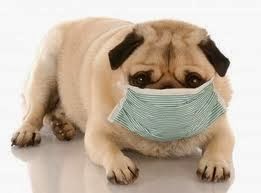
What Is Kennel Cough?
Kennel cough is a term used to describe both viral and bacterial infections that cause inflammation of a dog’s trachea. It’s similar to a chest cold in humans. Though it usually clears up on its own, kennel cough is highly contagious to other dogs. Unfortunately, kennel cough usually does not show visible symptoms for 5-7 days after exposure. While we make intense efforts to prevent an outbreak in our kennel through extensive cleaning and disinfecting, public awareness, and by requiring vaccinations, we cannot guarantee that your dog will not be exposed.
What Are the General Symptoms of Kennel Cough?
A persistent dry cough with a “honking” sound is the main clue your dog’s caught kennel cough. In most cases, dogs appear healthy except for the cough. Their appetite and activity level usually won't change. The cough may worsen after exercise, or if it's excited or pulls against its collar. Some dogs may also develop a fever and nasal discharge.
What Should I Do if I Think My Dog Has Kennel Cough?
If you suspect your dog has kennel cough, immediately isolate it from all other dogs and call Hollywood Animal Hospital. Do NOT bring the dog into the clinic, instead, a doctor and technician will meet you and the dog in the car to diagnose it.
How Did My Dog Catch Kennel Cough?
Dogs can catch kennel cough in several ways. It can spread through aerosols in the air, directly from dog to dog, or through germs on contaminated objects. Kennel cough is often spread while boarding in a kennel or an animal shelter, for example (hence the name), or through direct contact with other animals. The term kennel cough can be misleading because owners who don't board their pets may assume their dog cannot catch kennel cough. This is not necessarily true because any dog-dog interaction may spread the infection.
Kennel cough is so contagious that your pet might even catch it from sharing a water dish at the dog park or by simply greeting another dog. Most kennels will not board your pet without proof of a recent vaccination against parainfluenza and bordetella, two of the main causes of kennel cough.
Which Dogs Are Prone to Kennel Cough?
Most often, dogs that have frequent contact with other dogs, especially in enclosed or poorly ventilated areas, are most prone to becoming infected. Young and unvaccinated dogs are also at higher risk.
How Is Kennel Cough Prevented?
The best way to prevent kennel cough is to prevent exposure. Vaccinations are also available for several of the agents known to be involved in kennel cough, including parainfluenza, bordetella and adenovirus-2. We do recommend the bordetella vaccination for all dogs, but be advised that the vaccination is much like the flu vaccine in humans. It protects a dog against several strains of kennel cough but not all. If your dog has been vaccinated they still have a chance of becoming infected, but it is usually less severe and shorter-lived than in non-vaccinated dogs.
How Is Kennel Cough Treated?
Make an appointment to have a vet diagnose your dog with kennel cough so they can recommend the right course of treatment. It's always a good idea to come see us in case it isn't kennel cough and there is some other underlying problem. If it is kennel cough, the following course of treatment is recommended.
Dogs with kennel cough should be isolated from other dogs.
A humidifier or vaporizer can provide some relief. You can also allow your dog into the bathroom while you shower. The steam will help soothe her irritated breathing passages.
Avoid exposing her/him to cigarette smoke or other noxious, irritating fumes.
A cough suppressant may be prescribed and can be picked up at any of our local pharmacies.
If your dog pulls against her collar while being walked, replace it with a harness until the coughing subsides.
Supportive care is very important—be sure your dog is eating, drinking and in a stress-free environment.
Limit your dogs play and exercise.
How Long Does Kennel Cough Last?
In most cases, the signs of kennel cough gradually decrease and disappear after 10 days to 2 weeks. Young puppies, elderly dogs and other immunocompromised animals may take up to six weeks or more to recover. In rare cases, animals may remain infectious for long periods of time even after the symptoms have cleared up.
When Is It Time To See The Vet Again?
You should see some improvement in your dog’s condition within one week of treatment, but be alert to how long the symptoms last. If your dog has nasal discharge, is breathing rapidly, refuses to eat or seems lethargic, call us right away. Serious cases of kennel cough can lead to pneumonia if left untreated.
 When she arrived at the HAH she was
anxious, to say the least, and bleeding profusely. An exam and x-rays with Dr.
Carlos showed a degloving injury* isolated to her foot with multiple tendon
lacerations and two fractured metatarsal bones (foot.) GD was very lucky.
When she arrived at the HAH she was
anxious, to say the least, and bleeding profusely. An exam and x-rays with Dr.
Carlos showed a degloving injury* isolated to her foot with multiple tendon
lacerations and two fractured metatarsal bones (foot.) GD was very lucky.
























